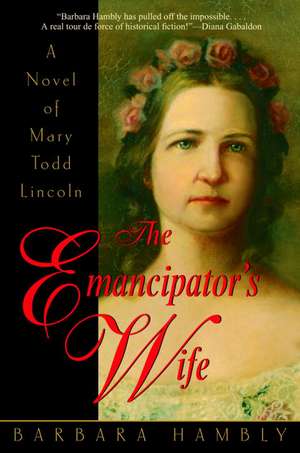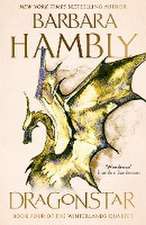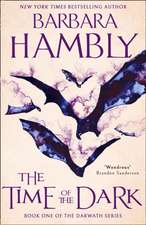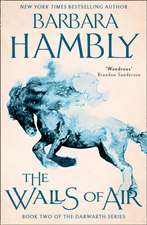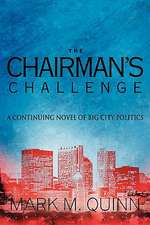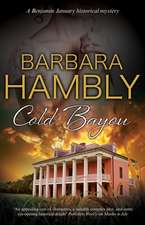The Emancipator's Wife
Autor Barbara Hamblyen Limba Engleză Paperback – 30 noi 2005
But their happiness won’t last nearly so long. Their first child will be born under the gathering clouds of a civil war, and three more follow. As Lincoln’s star rises, the pleasure-loving Mary learns, often the hard way, the rules of being a politician’s wife. But by the time the fiery storm of war passes, tragedy will have claimed two sons, scandal will shadow her days as First Lady, and an assassin’s bullet will take Lincoln himself, leaving Mary alone and all but forgotten by the nation that owed her husband its survival.
Yet it is in the years to come that Mary Todd Lincoln will truly come into her own. In public, she will fight to preserve Lincoln’s memory even as she battles a bitterly contested insanity trial. In private, she will struggle with depression and addiction as she endures the betrayals–both real and imagined–of family and friends.
With a gifted novelist’s imagination and a historian’s eye for detail, Barbara Hambly tells a story of astonishing scope, richly peopled with real-life characters and their fictional counterparts, a tour-de-force tale of power, politics, and the role of women in nineteenth- century America. The result is a Mary Todd Lincoln few have seen and none will forget–the fascinating, controversial woman of whom her husband could say: “My wife is as handsome as when she was a girl and I fell in love with her; and what is more, I have never fallen out”–Mary Todd, the woman who loved Abraham Lincoln.
From the Hardcover edition.
Preț: 148.02 lei
Nou
Puncte Express: 222
Preț estimativ în valută:
28.33€ • 29.46$ • 23.39£
28.33€ • 29.46$ • 23.39£
Carte disponibilă
Livrare economică 24 martie-07 aprilie
Preluare comenzi: 021 569.72.76
Specificații
ISBN-13: 9780553381931
ISBN-10: 0553381938
Pagini: 608
Dimensiuni: 159 x 234 x 27 mm
Greutate: 0.59 kg
Editura: Bantam Books
ISBN-10: 0553381938
Pagini: 608
Dimensiuni: 159 x 234 x 27 mm
Greutate: 0.59 kg
Editura: Bantam Books
Notă biografică
Barbara Hambly is the author of The Emancipator’s Wife, a finalist for the Michael Shaara Award for Excellence in Civil War Fiction. She is also the author of Fever Season, a New York Times Notable Book of the Year, and seven acclaimed historical novels.
Extras
Chapter One
Chicago May 19, 1875
She was surrounded by enemies.
For the dozenth time Mary Lincoln glanced sharply behind her, heart hammering in her throat with both panic and rage.
Nothing. Bowler-hatted businessmen in natty suits bought newspapers from scruffy boys, barefoot in the spring heat. Tight-corseted women, the ruffled swags that trailed from their bustles sweeping the dirty sidewalk, paused by the windows of shops to admire and chat. Immigrant vendors in grubby corduroy yelled their wares from pushcarts--apples, kerchiefs, mousetraps, toys. A cab darted by along Clark Street, hooves clattering, iron tires banging, as it dodged around trolleys, carriages, drays of barreled beer.
Downtown Chicago on a spring morning. Heat swimming up from the sidewalk bricks; the stink of horse-droppings.
She knew she was being followed. For weeks now she'd been certain of it.
Who? she wondered. Why?
And quickened her step. The fear that had shadowed her all her fifty-seven years breathed again at her shoulder. Her feet were swollen in her tight black kid shoes and the snip of breeze that whispered from Lake Michigan died away, leaving her sweating beneath the thick black veils. Why didn't people get out of her way? She dodged past a dawdling woman by a shop window. Can't they see I'm a widow? I'm entitled to consideration on that score, aren't I? Even if they don't know whose widow I am.
Thinking about him, even after all these years, made her throat constrict with the grief that had never eased.
She had to get home.
She gazed longingly after another cab that rattled by--they all drove like lunatics in this town! There was money in her purse, and even more hidden in secret pockets of her petticoats, in case of emergencies. But cabs were so expensive. She'd spent enough that morning as it was. Nine pairs of lace curtains at Gossage's, so beautiful! But I really will have to save after this.
So no cabs.
And the crowds on the trolleys filled her with nameless but familiar dread.
Why were people following her?
Why that elusive half-familiar glimpse of bulk and movement that she'd seen again and again during the past eight weeks?
Newspapermen? Those vile vampires who'd dogged her every step, twisted her every word...called her Confederate spy and worse?
Or was someone plotting to kill her as they'd killed her husband?
Or was it all something she imagined?
She pushed that troubling suspicion away.
Movement in the corner of her vision--were things starting to appear and disappear again? Not another migraine, she thought in weary despair. I had one only yesterday, or was it the day before? Was the blazing shimmer that came and went only the reflection of the noon sun on the windows of the high buildings? Or the herald of yet another bout of nausea, blindness, pain?
Anxiety swamped the worry about being followed in a greater wave of panic. I have to get home! In her room she'd be safe. She could take her medicine before those kinked burning lines started to creep across her vision, before sick disorientation overtook her. The room would be hot and unbearably stuffy--mentally she calculated the cost of even the most modest chamber in the Grand Pacific Hotel against what her husband had left her, against the pension she had finally pried out of those tight-fisted ungrateful liars in Congress. But at least there she would be safe.
She could barely remember a time when she had not felt herself in danger.
A pack of ragamuffin boys flurried past her, like blown leaves among the crowd. Their treble laughter brought back the laughter of her own sons and the stab of grief was as piercing as if they had each died yesterday. Eddie scarcely more than a baby, crying with fever as he clung to her hand. Sweet-faced, sweet-natured Willie, gentle and always so worried about her, bringing her flowers from the weedy lots behind the Capitol. And Tad, flighty and willful, growing daily more like his father...
She squeezed her mind shut against Mr. Lincoln's image. She'd never thought of him as anything but Mr. Lincoln--or Father, when they were alone. His shadow rose behind the shadows of her sons: the looming gawky height, as if his body had been put together from a bundle of slats, the deft lightness of his touch. His hands had been huge, nearly twice the length of hers when they'd press them palm to palm and laugh....
After his death she'd given away everything he'd possessed, lest the sight of even his reading-glasses in a drawer surprise her with heart-crushing pain. In the ten years since then she'd visited hundreds of mediums, speakers with and summoners of the dead, begging for only a glimpse of him. Desperate to hear his voice again, to hear him call her "Mother," and see his smile.
Father, she thought, how could you have left me in this awful place alone?
The Grand Pacific Hotel loomed before her, story after story of stone and glaring glass. Only ten years, she thought wonderingly, since Washington's muddy unpaved streets, since the tumult of soldiers tramping by in the sticky night. Ten years since she'd heard the thunder of enemy guns beyond the river. Chicago with its macadam-paved streets, with its trolley cars and bustles and advertising posters and its thousands and thousands of immigrants, seemed like another world, as if she had somehow missed her way coming back from Europe in '71 and fetched up in some bewildering alien land.
Her anxiety lessened somewhat as she climbed the Grand Pacific's marble steps and crossed the lobby's acres of red plush carpet like a determined black bug scuttling for the baseboard. Almost home. Almost safe.
The Grand Pacific was expensive, with its French chef and its conservatory garden. But Abraham Lincoln's widow couldn't be seen to live in common lodgings. That much she owed his memory. And boarding-houses had always been abominations to her.
Mr. Turner, the manager, was understanding and kind. When she'd wake in terror in the night, he'd provide a reliable chambermaid to stay in her room with her at only a very modest charge. He was reassuring and helpful, if occasionally maddeningly stupid, during those spells when voices seemed to be speaking to her out of the walls and floor, when during her migraines she could see the spirit of an Indian warrior pulling the bones out of her face; when she'd wake in panic and terror, thinking she smelled smoke--when she'd see the city in flames, the wall of fire approaching....
Mary shook her head at herself as she climbed the stairs. The Grand Pacific was equipped with modern elevators but she'd never trusted such things. The reminder of her spells of confusion made her headache worse. Maybe it was all only her imagination. Though she only cloudily recalled what she did and said in her spells, it did seem to her they mostly came on her in the afternoons. All she had to do, really, was be a little careful about staying inside.
She pushed the thought out of her mind. Her heart was thudding and her feet, her back, her head were in agony. Her medicine would make her feel better.
And sometimes during her spells--especially at night--one or another of her sons would come to her, beautiful shining figures, smiling and holding out their hands in comfort.
Only Robert was left, of the four beautiful boys she had borne.
Mary paused on the stairs to get her breath, to rest the searing ache in her back. She supposed her shoes were not really made for walking long distances in, but she would not be like those absurd suffragist women who went around in Bloomer costumes and ugly boots. Her friend Myra had often expounded on "rational" dress. That really would give Robert a seizure, she thought, and smiled a little despite her discomfort at the recollection of her chronically disapproving eldest son. He thinks I'm eccentric enough without that.
Poor Robert. As she resumed her climb she wondered whether he suffered from an overdeveloped sense of his own importance, or merely a complete lack of imagination. Probably both, she thought. Such a stuffy man, even before he married that horrid girl...
Yet her heart ached with love for him, and for her granddaughter...Mr. Lincoln's granddaughter. Beautiful little Mamie. The terrible dream she'd had in Florida two months ago, the dream of Robert lying ill, dying just as Tad and Eddie and Willie had died, had brought her flying back here, desperate to save him, to push that terrible shadow away if she could. Desperate that he not leave her, as all the others had left her...
Mary paid a quick, grateful visit to the ladies' lavatory on the way down the hall. Hot weather always brought back the burning itches that had tormented her since Tad's birth, over two decades ago. Then at last, with a sense of having safely negotiated an unknown battlefield yet again, she unlocked her own room.
It was small, and, as she'd feared, already appallingly stuffy. Since Tad's death she'd found daylight almost too harsh to stand, but even the single gas jet burning in the heavily curtained room added to the already intolerable summer heat. She'd insisted on the least expensive room available in the hotel--really, her money disappeared so quickly!--but for that reason it was already too crowded for comfort. In addition to the eleven trunks she'd brought back from Florida with her--such a beautiful place, and the doctors there most sympathetic and helpful--she'd done a good deal of shopping in these past weeks. Mostly to pass the time, to get herself out--really, what else was there for a woman to do?--but there was no telling when she might get a house of her own, a home of her own, again.
Her plump hands shook as she put aside the packages from yesterday's shopping expedition (an album of poetry and twelve yards of exquisite jade-green satin, and shoes to match) and opened the cupboard, barely to be reached behind the trunks. She was definitely getting a migraine, and she could scarcely see the bottles as she took them out. Not that it mattered which was which. They're all the same, really. And Dr. Somers in Florida said they're all beneficial. Godfrey's Cordial, Ma-Sol-Pa Herbal Indian Balm, Dr. Foote's Sanitary Medical Tonic, Nervine, Hunt's Female Revivifier...
She poured them all in a tumbler and drained it, savoring the musky intensity, the burning comforting warmth that rose through her. She'd begin to feel better in a few moments....
A knock sounded on the door.
The delivery boy from Gossage's. That was quick. But it wasn't the delivery boy who stood in the hall when she opened the door. For a flashing, confusing moment, between the uncertain light of the curtained chamber and her own slightly blurred eyesight, Mary thought it was her husband.
Mr. Lincoln...
Was it, impossibly, him? As the others had appeared to her, had he finally come?
She blinked, then said uncertainly, "Mr. Swett?"
"Mrs. Lincoln." Leonard Swett took off his hat. It was the high silk hat of a professional that had deceived her migraine-dazzled eyes by adding to his six-foot height. Swett's face was lean, and he wore the same kind of beard that Mr. Lincoln had during the last few years of his life, a jawline Quaker beard without a mustache. Memories flared through her mind, of Swett and his wife, Laura--before Laura's incapacitating illness--coming to dinner at that little cottage on Eighth Street in Springfield. Of Swett laughing with Mr. Lincoln over this lawsuit or that, like boys who've trounced each other behind the schoolhouse, then dusted themselves off and shaken hands.
What was Mr. Swett doing here at her room? Why hadn't he sent up a card? Had he sent up a card, and she just didn't remember? No, of course not, she'd just gotten here herself....
"I do apologize." Mary spread her lace-mitted hands across the sable crape of her skirts and wondered how quickly she could get rid of him. She was exhausted, her head was throbbing, and, having taken her medicine, she wanted only to lie down.
Why hadn't he sent up a card and asked her to meet him in the lobby? A gentleman never came up to a lady's room.
But it was a basic tenet of Southern womanhood that a lady always gives a gentleman the benefit of the doubt. So instead of asking tartly if he'd been born in a barn, Mary explained, "I've just come in, and have not had time to change. What might I do for you?" She saw now that the boy from Gossage's was there, waiting in the hallway gloom, with two men in uniforms she did not recognize. Big men. A problem about the curtains? Probably the fault of that stupid clerk...
"I regret exceedingly that it is I who must perform this office, Mrs. Lincoln." Swett drew a folded sheet of paper from his coat. He held it out to her in his neatly gloved hand. "This is a writ of arrest from the State of Illinois. You are being charged with lunacy."
If he'd slapped her face she could not have been more surprised. In that first instant she wasn't even taken aback, merely confused, wondering if this were a dream. One of those weird visions, like the Indian spirit who tortured her during her migraines, or the voices that spoke to her out of the walls. Goodness knew she felt unreal enough, as if she'd put her foot down what she'd thought was a step in a familiar staircase, only to find no footing there.
But in Swett's pale eyes she saw that expression with which she was so familiar from a lifetime around lawyers and politicians. That gauging look, waiting for a reaction as a hunter waits for a turkey to step out from behind a bush.
"Lunacy?" Mary thrust her hands behind her. Time and time again she'd heard Mr. Lincoln say to clients, Whatever you do, don't take any paper they try to hand you.
Swett was still talking.
"...courtroom today--this afternoon, in fact--" He took out his watch, as if to emphasize to her how valuable everybody's time was. "--to defend yourself at a hearing..."
"What hearing?" She blinked at him, feeling nonplussed in the most literal sense of the word: at a point from which one cannot go on. He couldn't really be charging her with lunacy. She had to be mistaken about that. She was Abraham Lincoln's wife! "How can it be this afternoon? I need a lawyer...."
"A lawyer has already been arranged for you, Mrs. Lincoln."
"By whom?" Her voice sounded astoundingly calm in her own ears. She remembered all those times back in Springfield, when people would come to Lincoln's office asking for help. You could get a lawyer in a day, but seldom in an hour.
Robert, she thought. Robert will know how to get me a lawyer. He's a lawyer himself. He'll probably defend me; that way I won't have to spend any money. Her mind was working slowly, clogged with a dreamlike confusion. It was hard not to simply stare at the pattern of Mr. Swett's silver silk waistcoat. She must keep her mind focused.
From the Hardcover edition.
Chicago May 19, 1875
She was surrounded by enemies.
For the dozenth time Mary Lincoln glanced sharply behind her, heart hammering in her throat with both panic and rage.
Nothing. Bowler-hatted businessmen in natty suits bought newspapers from scruffy boys, barefoot in the spring heat. Tight-corseted women, the ruffled swags that trailed from their bustles sweeping the dirty sidewalk, paused by the windows of shops to admire and chat. Immigrant vendors in grubby corduroy yelled their wares from pushcarts--apples, kerchiefs, mousetraps, toys. A cab darted by along Clark Street, hooves clattering, iron tires banging, as it dodged around trolleys, carriages, drays of barreled beer.
Downtown Chicago on a spring morning. Heat swimming up from the sidewalk bricks; the stink of horse-droppings.
She knew she was being followed. For weeks now she'd been certain of it.
Who? she wondered. Why?
And quickened her step. The fear that had shadowed her all her fifty-seven years breathed again at her shoulder. Her feet were swollen in her tight black kid shoes and the snip of breeze that whispered from Lake Michigan died away, leaving her sweating beneath the thick black veils. Why didn't people get out of her way? She dodged past a dawdling woman by a shop window. Can't they see I'm a widow? I'm entitled to consideration on that score, aren't I? Even if they don't know whose widow I am.
Thinking about him, even after all these years, made her throat constrict with the grief that had never eased.
She had to get home.
She gazed longingly after another cab that rattled by--they all drove like lunatics in this town! There was money in her purse, and even more hidden in secret pockets of her petticoats, in case of emergencies. But cabs were so expensive. She'd spent enough that morning as it was. Nine pairs of lace curtains at Gossage's, so beautiful! But I really will have to save after this.
So no cabs.
And the crowds on the trolleys filled her with nameless but familiar dread.
Why were people following her?
Why that elusive half-familiar glimpse of bulk and movement that she'd seen again and again during the past eight weeks?
Newspapermen? Those vile vampires who'd dogged her every step, twisted her every word...called her Confederate spy and worse?
Or was someone plotting to kill her as they'd killed her husband?
Or was it all something she imagined?
She pushed that troubling suspicion away.
Movement in the corner of her vision--were things starting to appear and disappear again? Not another migraine, she thought in weary despair. I had one only yesterday, or was it the day before? Was the blazing shimmer that came and went only the reflection of the noon sun on the windows of the high buildings? Or the herald of yet another bout of nausea, blindness, pain?
Anxiety swamped the worry about being followed in a greater wave of panic. I have to get home! In her room she'd be safe. She could take her medicine before those kinked burning lines started to creep across her vision, before sick disorientation overtook her. The room would be hot and unbearably stuffy--mentally she calculated the cost of even the most modest chamber in the Grand Pacific Hotel against what her husband had left her, against the pension she had finally pried out of those tight-fisted ungrateful liars in Congress. But at least there she would be safe.
She could barely remember a time when she had not felt herself in danger.
A pack of ragamuffin boys flurried past her, like blown leaves among the crowd. Their treble laughter brought back the laughter of her own sons and the stab of grief was as piercing as if they had each died yesterday. Eddie scarcely more than a baby, crying with fever as he clung to her hand. Sweet-faced, sweet-natured Willie, gentle and always so worried about her, bringing her flowers from the weedy lots behind the Capitol. And Tad, flighty and willful, growing daily more like his father...
She squeezed her mind shut against Mr. Lincoln's image. She'd never thought of him as anything but Mr. Lincoln--or Father, when they were alone. His shadow rose behind the shadows of her sons: the looming gawky height, as if his body had been put together from a bundle of slats, the deft lightness of his touch. His hands had been huge, nearly twice the length of hers when they'd press them palm to palm and laugh....
After his death she'd given away everything he'd possessed, lest the sight of even his reading-glasses in a drawer surprise her with heart-crushing pain. In the ten years since then she'd visited hundreds of mediums, speakers with and summoners of the dead, begging for only a glimpse of him. Desperate to hear his voice again, to hear him call her "Mother," and see his smile.
Father, she thought, how could you have left me in this awful place alone?
The Grand Pacific Hotel loomed before her, story after story of stone and glaring glass. Only ten years, she thought wonderingly, since Washington's muddy unpaved streets, since the tumult of soldiers tramping by in the sticky night. Ten years since she'd heard the thunder of enemy guns beyond the river. Chicago with its macadam-paved streets, with its trolley cars and bustles and advertising posters and its thousands and thousands of immigrants, seemed like another world, as if she had somehow missed her way coming back from Europe in '71 and fetched up in some bewildering alien land.
Her anxiety lessened somewhat as she climbed the Grand Pacific's marble steps and crossed the lobby's acres of red plush carpet like a determined black bug scuttling for the baseboard. Almost home. Almost safe.
The Grand Pacific was expensive, with its French chef and its conservatory garden. But Abraham Lincoln's widow couldn't be seen to live in common lodgings. That much she owed his memory. And boarding-houses had always been abominations to her.
Mr. Turner, the manager, was understanding and kind. When she'd wake in terror in the night, he'd provide a reliable chambermaid to stay in her room with her at only a very modest charge. He was reassuring and helpful, if occasionally maddeningly stupid, during those spells when voices seemed to be speaking to her out of the walls and floor, when during her migraines she could see the spirit of an Indian warrior pulling the bones out of her face; when she'd wake in panic and terror, thinking she smelled smoke--when she'd see the city in flames, the wall of fire approaching....
Mary shook her head at herself as she climbed the stairs. The Grand Pacific was equipped with modern elevators but she'd never trusted such things. The reminder of her spells of confusion made her headache worse. Maybe it was all only her imagination. Though she only cloudily recalled what she did and said in her spells, it did seem to her they mostly came on her in the afternoons. All she had to do, really, was be a little careful about staying inside.
She pushed the thought out of her mind. Her heart was thudding and her feet, her back, her head were in agony. Her medicine would make her feel better.
And sometimes during her spells--especially at night--one or another of her sons would come to her, beautiful shining figures, smiling and holding out their hands in comfort.
Only Robert was left, of the four beautiful boys she had borne.
Mary paused on the stairs to get her breath, to rest the searing ache in her back. She supposed her shoes were not really made for walking long distances in, but she would not be like those absurd suffragist women who went around in Bloomer costumes and ugly boots. Her friend Myra had often expounded on "rational" dress. That really would give Robert a seizure, she thought, and smiled a little despite her discomfort at the recollection of her chronically disapproving eldest son. He thinks I'm eccentric enough without that.
Poor Robert. As she resumed her climb she wondered whether he suffered from an overdeveloped sense of his own importance, or merely a complete lack of imagination. Probably both, she thought. Such a stuffy man, even before he married that horrid girl...
Yet her heart ached with love for him, and for her granddaughter...Mr. Lincoln's granddaughter. Beautiful little Mamie. The terrible dream she'd had in Florida two months ago, the dream of Robert lying ill, dying just as Tad and Eddie and Willie had died, had brought her flying back here, desperate to save him, to push that terrible shadow away if she could. Desperate that he not leave her, as all the others had left her...
Mary paid a quick, grateful visit to the ladies' lavatory on the way down the hall. Hot weather always brought back the burning itches that had tormented her since Tad's birth, over two decades ago. Then at last, with a sense of having safely negotiated an unknown battlefield yet again, she unlocked her own room.
It was small, and, as she'd feared, already appallingly stuffy. Since Tad's death she'd found daylight almost too harsh to stand, but even the single gas jet burning in the heavily curtained room added to the already intolerable summer heat. She'd insisted on the least expensive room available in the hotel--really, her money disappeared so quickly!--but for that reason it was already too crowded for comfort. In addition to the eleven trunks she'd brought back from Florida with her--such a beautiful place, and the doctors there most sympathetic and helpful--she'd done a good deal of shopping in these past weeks. Mostly to pass the time, to get herself out--really, what else was there for a woman to do?--but there was no telling when she might get a house of her own, a home of her own, again.
Her plump hands shook as she put aside the packages from yesterday's shopping expedition (an album of poetry and twelve yards of exquisite jade-green satin, and shoes to match) and opened the cupboard, barely to be reached behind the trunks. She was definitely getting a migraine, and she could scarcely see the bottles as she took them out. Not that it mattered which was which. They're all the same, really. And Dr. Somers in Florida said they're all beneficial. Godfrey's Cordial, Ma-Sol-Pa Herbal Indian Balm, Dr. Foote's Sanitary Medical Tonic, Nervine, Hunt's Female Revivifier...
She poured them all in a tumbler and drained it, savoring the musky intensity, the burning comforting warmth that rose through her. She'd begin to feel better in a few moments....
A knock sounded on the door.
The delivery boy from Gossage's. That was quick. But it wasn't the delivery boy who stood in the hall when she opened the door. For a flashing, confusing moment, between the uncertain light of the curtained chamber and her own slightly blurred eyesight, Mary thought it was her husband.
Mr. Lincoln...
Was it, impossibly, him? As the others had appeared to her, had he finally come?
She blinked, then said uncertainly, "Mr. Swett?"
"Mrs. Lincoln." Leonard Swett took off his hat. It was the high silk hat of a professional that had deceived her migraine-dazzled eyes by adding to his six-foot height. Swett's face was lean, and he wore the same kind of beard that Mr. Lincoln had during the last few years of his life, a jawline Quaker beard without a mustache. Memories flared through her mind, of Swett and his wife, Laura--before Laura's incapacitating illness--coming to dinner at that little cottage on Eighth Street in Springfield. Of Swett laughing with Mr. Lincoln over this lawsuit or that, like boys who've trounced each other behind the schoolhouse, then dusted themselves off and shaken hands.
What was Mr. Swett doing here at her room? Why hadn't he sent up a card? Had he sent up a card, and she just didn't remember? No, of course not, she'd just gotten here herself....
"I do apologize." Mary spread her lace-mitted hands across the sable crape of her skirts and wondered how quickly she could get rid of him. She was exhausted, her head was throbbing, and, having taken her medicine, she wanted only to lie down.
Why hadn't he sent up a card and asked her to meet him in the lobby? A gentleman never came up to a lady's room.
But it was a basic tenet of Southern womanhood that a lady always gives a gentleman the benefit of the doubt. So instead of asking tartly if he'd been born in a barn, Mary explained, "I've just come in, and have not had time to change. What might I do for you?" She saw now that the boy from Gossage's was there, waiting in the hallway gloom, with two men in uniforms she did not recognize. Big men. A problem about the curtains? Probably the fault of that stupid clerk...
"I regret exceedingly that it is I who must perform this office, Mrs. Lincoln." Swett drew a folded sheet of paper from his coat. He held it out to her in his neatly gloved hand. "This is a writ of arrest from the State of Illinois. You are being charged with lunacy."
If he'd slapped her face she could not have been more surprised. In that first instant she wasn't even taken aback, merely confused, wondering if this were a dream. One of those weird visions, like the Indian spirit who tortured her during her migraines, or the voices that spoke to her out of the walls. Goodness knew she felt unreal enough, as if she'd put her foot down what she'd thought was a step in a familiar staircase, only to find no footing there.
But in Swett's pale eyes she saw that expression with which she was so familiar from a lifetime around lawyers and politicians. That gauging look, waiting for a reaction as a hunter waits for a turkey to step out from behind a bush.
"Lunacy?" Mary thrust her hands behind her. Time and time again she'd heard Mr. Lincoln say to clients, Whatever you do, don't take any paper they try to hand you.
Swett was still talking.
"...courtroom today--this afternoon, in fact--" He took out his watch, as if to emphasize to her how valuable everybody's time was. "--to defend yourself at a hearing..."
"What hearing?" She blinked at him, feeling nonplussed in the most literal sense of the word: at a point from which one cannot go on. He couldn't really be charging her with lunacy. She had to be mistaken about that. She was Abraham Lincoln's wife! "How can it be this afternoon? I need a lawyer...."
"A lawyer has already been arranged for you, Mrs. Lincoln."
"By whom?" Her voice sounded astoundingly calm in her own ears. She remembered all those times back in Springfield, when people would come to Lincoln's office asking for help. You could get a lawyer in a day, but seldom in an hour.
Robert, she thought. Robert will know how to get me a lawyer. He's a lawyer himself. He'll probably defend me; that way I won't have to spend any money. Her mind was working slowly, clogged with a dreamlike confusion. It was hard not to simply stare at the pattern of Mr. Swett's silver silk waistcoat. She must keep her mind focused.
From the Hardcover edition.
Recenzii
"From its perfect title to its beautiful poignant, last scene, this is a wonderful portrait of one of the most important, complex, and misunderstood figures in American history—a brilliant novel of the Civil War."—Max Byrd
"Touching...Hambly has a knack for bringing historical figures to life in all their flawed humanity."—Publishers Weekly
"Touching...Hambly has a knack for bringing historical figures to life in all their flawed humanity."—Publishers Weekly
Descriere
Ten years after Abraham Lincoln's death, the president's widow is incarcerated in an insane asylum by her only surviving son. It is from this little-known episode that Hambly spins her intimate, insightful tapestry of this difficult, too-intelligent woman's life.
